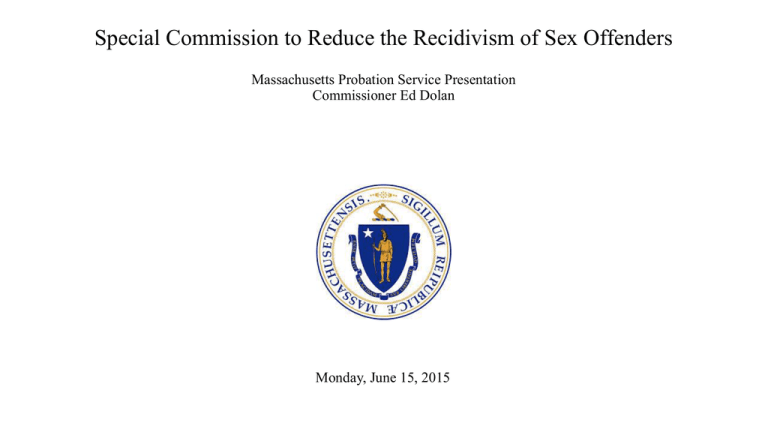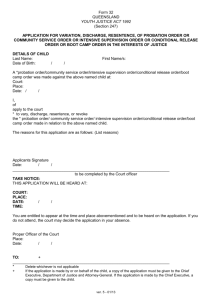
Special Commission to Reduce the Recidivism of Sex Offenders
Massachusetts Probation Service Presentation
Commissioner Ed Dolan
Monday, June 15, 2015
Massachusetts Probation Service
Presenting Today
•
•
•
•
•
•
Ed Dolan, Commissioner
Brian Mirasolo, Field Services Administrator
Andy Peck, Statewide Supervisor for the Superior Court Probation Departments
Melissa Charlton, Probation Officer at Worcester Superior Court
Philip Carofaniello, Assistant Chief Probation Officer at Dudley District Court
Nilza Sylvestre, Chief Probation Officer at Dudley District Court
Also Joining Us
• Dianne Fasano, Deputy Commissioner for Field Services
Probation Landscape + Resource Challenges
Probation Caseload
•
•
•
•
Risk/Need Probationers =
19,651
DUIL Probation =
11,726
Pre Trial Conditional Release = 11,289
Administrative Caseload =
26,985
• Approximately 1,300-1,500 Probationers being supervised for sexual offenses daily
• 94 court locations statewide
• Superior (14), District (61), BMC (8), Juvenile (11)
• 36 Courts staffed at 70% or below
• < 800 Probation Officers
Risk/Need Assessment
• Ohio Risk Assessment SystemCommunity Supervision Tool (ORASCST)
-A public domain actuarial tool used to help
strategically manage the supervision of
individuals on probation
-35 questions across 7 domains
-Helps us better understand an individual’s
likelihood to recidivate (risk) and what dynamic
areas drive an individual’s criminal behavior
(need) (anti-social attitudes + behaviors, antisocial peers, substance use, family support,
education/employment, etc.)
Evidence Based Community Supervision
Practices (EBCSP)
• Specific face-to-face communication model/skills that lead to
reductions in recidivism when used by officers with probationers
- Active Listening
- Role Clarification
- Giving Feedback
*Effective Reinforcement
* Effective Disapproval
- Structured Skill Building via the Cognitive Model
Probation Supervision of Sexual Offenders
If there is a finding of sufficient facts or conviction for an offense sexual
in nature:
• Required to have a minimum of two face-to-face contacts with the probationer per
month (30 calendar days). At least one of these contacts every two months shall be
a scheduled home visit for the duration of probation (no matter what a person’s
ORAS-CST score is)
• Required to provide verification of address and income every 14 days at the
minimum for the duration of probation
• A probation officer must refer for court ordered programming at first face-to-face
contact
GPS Requirement
G.L. c. 265, § 47
“Any person who is placed on probation for any
offense listed within the definition of ‘sex
offense,’ a ‘sex offense involving a child’ or a
‘sexually violent offense,’ as defined in section
178C of chapter 6, shall, as a requirement of any
term of probation, wear a global positioning
system device…at all times for the length of his
probation...”
• 35 offenses requiring GPS
• 818 sex offenders on GPS in MA as of 6/10/15
Worcester Superior Court
Intensive Sex Offender Supervision Program
COMPONENTS
1. Intensive Treatment
2. Intensive Supervision and
Surveillance
Worcester Superior Court
Intensive Sex Offender Supervision Program
• Intensive Treatment
- In office
- Evidence Based Principles of Effective Intervention
- Polygraphs
-Transition to Community Group
• Outcomes
Worcester Superior Court
Intensive Sex Offender Supervision Program
• Intensive Supervision and Surveillance
-Operation Watch Dog with the Worcester Police Department
• Outcomes
Dudley D.C.
Sex Offender Containment Program
CONTAINMENT
A collaboration between multiple criminal justice agencies including six
local police departments, MA State Police, DA Early and Dudley DC
Probation. Victim centered philosophy that includes intensive
community supervision, risk assessment, sex offender treatment, GPS
monitoring, restriction of travel patterns, practices specifically designed
to limit aspects of privacy and restrict access to victims.
Dudley D.C.
Sex Offender Containment Program
APPROACH
1. Supervision
2. Sex Offender Specific
Treatment
3. Polygraph Exams
• Outcomes






